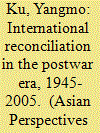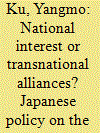| Srl | Item |
| 1 |
ID:
085292


|
|
|
|
|
| Publication |
2008.
|
| Summary/Abstract |
Under what conditions do sets of two former adversary states with deeply rooted historical animosity try to reconcile with each other? When they seek bilateral reconciliation, why are the outcomes significantly different? France and Germany were historic antagonists that fought three catastrophic wars between 1870 and 1945. In the postwar era, however, their antagonism and hostility dramatically evolved into mutual partnership and cooperation. Unlike the Franco-German case, Japan-Republic of Korea relations still remain frigid due to mistrust and enmity, although sixty-three years have passed since Korea's liberation from Japanese colonial rule. This article argues that in both cases, the motives for reconciliation were mainly derived from realpolitik concerns such as security and economy. Structural conditions also affected the initiation of international reconciliation. Nonetheless, it was the dynamics of political leaders and nongovernmental organizations that played central roles in differentiating the reconciliation processes and outcomes in the two dyadic relationships.
|
|
|
|
|
|
|
|
|
|
|
|
|
|
|
|
| 2 |
ID:
140287


|
|
|
|
|
| Summary/Abstract |
When and why does a perpetrator state take a contrite stance on its past wrongs? More specifically, why do Japanese behaviors differ over time in addressing apology and compensation with regard to the comfort women issue? In this article I address these questions by testing two hypotheses, utilizing an instrumentalist approach and a transnational-political activism model. The former posits a perpetrator state is more likely to take a contrite stance on its past misdeeds when it calculates such action is in its security and/or economic interests. The latter hypothesizes that when transnational activism is powerful and a perpetrator state is led by a progressive ruling coalition, the state is more likely to adopt conciliatory policies toward historical issues. I find that the transnational-political activism model possesses more explanatory power than instrumentalism for within-case variations in Japanese behavior toward the comfort women issue. The two approaches are not, however, mutually exclusive and are complementary in some regards. The effect of transnational activism is heightened when the target state is faced with other geopolitical incentives and/or when the target state is led by a progressive ruling coalition and has weak conservative reaction.
|
|
|
|
|
|
|
|
|
|
|
|
|
|
|
|